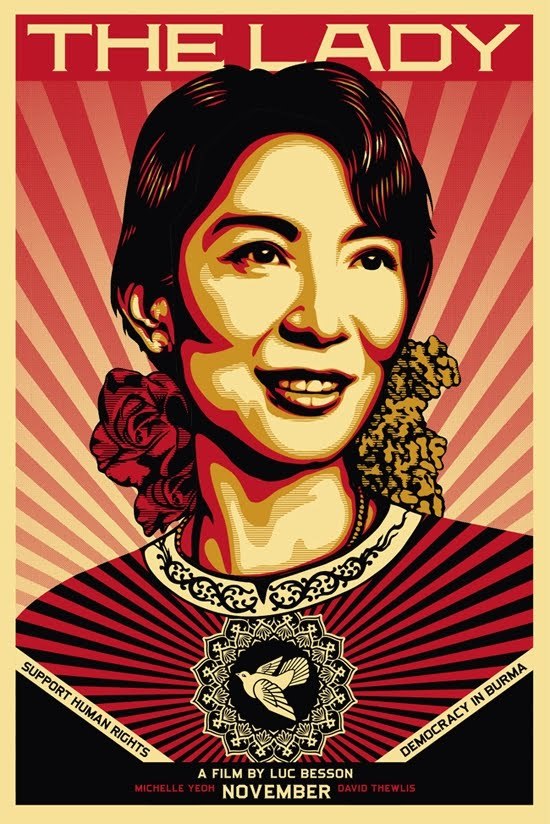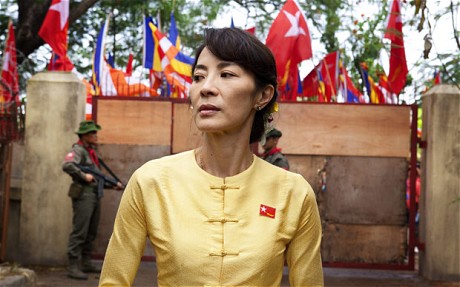
Like many of Luc Besson’s films, The Lady focuses on a woman who rises like a phoenix from the ashes of violent tragedy to transform herself. Like the heroine in Besson’s recent Columbiana, our titular lady is just a small child in the film’s opening moments when her father is ruthlessly gunned down by bad men. It is a familiar set-up for France’s most prolific action filmmaker. Yet that is where the similarities end. Our heroine does not train to become an assassin in the wake of her father’s murder. She never touches a gun let alone kills anyone. There are no chases, no explosions, no martial arts. And not only does she never avenge her father’s death, her father’s killer receives no comeuppance whatsoever. Besson has given adrenaline a rest for a moment to tell a very different kind of story, a dramatic biopic of Nobel Peace Prize winner Aung San Suu Kyi. And the results are something of a mixed bag.
In 1947, when Suu Kyi was only two years old, her father negotiated Burma’s independence from the British Empire. He was then assassinated by rivals that same year (depicted in The Lady‘s prologue). Suu Kyi went on to study abroad, earn a PhD, work at the UN in New York, marry British scholar Dr. Michael Aris in 1972, settling in London and raising two children. The film begins in 1998, when Aris (David Thewlis) is diagnosed with cancer. You have to tell your wife, others inform Aris, but he says his wife has enough to worry about at the moment. We then skip through time, back to 1988, when Suu Kyi (Michelle Yeoh) returns to Burma to care for her ailing mother. As fate would have it, while Suu Kyi is in Burma, there is a shift in power amongst the country’s ruling party. Suu Kyi is convinced by friends and associates to follow in her father’s footsteps and fight for democracy. Long story short, Suu Kyi helps found the National League for Democracy and is put under house arrest by Burma’s military junta, who fears martyring her and instead passive aggressively tries to break her spirit by separating her from Aris and her two teenage sons.
It seems like half of all action movies have Besson’s name somewhere in the credits as writer or producer, but, like George Miller, his directing credits in the 00’s have been mostly restricted to an animated children’s franchise (Arthur and the Invisibles; there are now three films in the series). The Lady seems an unlikely endeavor for the mad Frenchmen, and it is. You would be in your rights to Google The Lady after viewing it to confirm that the film was indeed directed by that Luc Besson. After all, Besson’s previous foray into “non-fiction” was The Messenger: The Story of Joan of Arc, which featured gonzo camerawork, sprawling battles and Dustin Hoffman as the world’s freakiest Jiminy Cricket. Aside from the film’s opening moments of violence, The Lady is slow-paced and gentle, almost to a fault. Besson has couched his Bessonness. Those hoping to catch glimpses of action-Besson hiding in the film shouldn’t waste their time. He ain’t here. Besson is trying something new.

The big win of The Lady is Michelle Yeoh. Like Besson, Yeoh is mostly associated with ass-kicking. We’ve certainly all seen her do some legitimate acting, but it nonetheless becomes more pronounced when she isn’t periodically stooping into a readied fighting stance. Yeoh makes an ideal Suu Kyi. She looks similar to her real-life counterpart (more attractive, but that’s par for the course), though more importantly Yeoh always resonates with power. Suu Kyi isn’t a powerful person. She’s quiet, restrained, and thoughtful. But for her to quietly do what she did in Burma obviously took immense personal power. Yeoh allows you to believe that this otherwise demure woman has the tenacity lurking beneath her surface to stand up to a junta, without scenery chewing speeches or set pieces to otherwise convey the impression. I wouldn’t be surprised to see Yeoh get some nominations for this. And if you’re into David Thewlis, then you’re in luck, cause he Thewlises the shit out of The Lady. Thewlis, with his pursed lips and secluded chin, has always seemed like the British gene gone too far, so he generally does not work well (for me at least) in romances. But he thrives here. Aris is the heart of the film, and the ongoing subplot of his attempts to get himself and his two sons (played endearingly and adorably by Jonathan Raggett and Jonathan Woodhouse) visas to visit Suu Kyi is the most emotionally compelling facet of The Lady. The scene when Suu Kyi finally learns of Aris’ cancer, and the couple try and communicate over Suu Kyi’s constantly tampered with phone line, is heartbreaking. Thewlis also represents the weirdest aspect of the film. In real life, Aris has an identical twin. A slightly fatter identical twin if The Lady is accurate. So amidst the quiet no-frills unfolding of the film we periodically get some Devil’s Double-style double Thewlis shenanigans. (Which made me realize I want to see an entire film with Thewlis playing twins.)
Sadly, The Lady‘s biggest roadblock is: fact. I say “sadly” because there is nothing more insulting than taking a harrowing true-life story and movie-izing it to make things snappier. Aung San Suu Kyi’s story is a compelling one, but its exact ‘plot’ beats don’t lend themselves very naturally to a film — at least not as presented by Besson and screenwriter Rebecca Frayn (I don’t know enough about Suu Kyi’s life to accurately comment). Anyone who saw Rambo will know that there isn’t exactly going to be a super satisfying resolution to Suu Kyi’s struggles with the Burmese government. * And without betraying actual history, The Lady isn’t able to have the kind of final ‘movie moments’ in the Suu Kyi/Aris storyline that will stay with audiences either. Plus, while intellectually we can all respect and admire Suu Kyi’s refusal to leave Burma and give up on her people, at the end of the day we’re still watching a movie about a decade-long house arrest. There isn’t much in the way of tension or thrust to the narrative, because we know the villains aren’t going to hurt Suu Kyi. We know this because we see them talking about it, often humorously spazzing out over their own ineffectualness. The Burmese government are violent monsters. Yet, the gravest personal danger Suu Kyi is ever in is when she’s on a hunger strike. Lying in bed. In her huge Burmese house. That isn’t meant as a snarky dig on Suu Kyi, despite how it sounded. Her story is more than deserving of being told, but that is its own issue. The Lady is a movie. Had it been fictional it would be something of a dull mess. The gravity of true events can only carry things so far. The Lady needed a bit more to make the transition from “great story” to “great movie.”
Theater or Rental or Skip It:
Currently the film’s American release is restricted to an Oscar-qualifying run in Los Angeles, so you don’t exactly have a choice just yet. Presumably it will get a wider limited release at some point in 2012. I do not think this is an essential film, and is most certainly a rental, unless you’re a Besson completist or have a personal affinity for the subject matter. It is a good movie, but one that you can easily skip entirely. You won’t be mad you wasted your time watching it, but conversely you probably won’t be happy you watched it either.
Rating: 




Out of a Possible 5 Stars
* Someone get Besson and Stallone on the phone! I just had a great idea for a cross-over sequel!